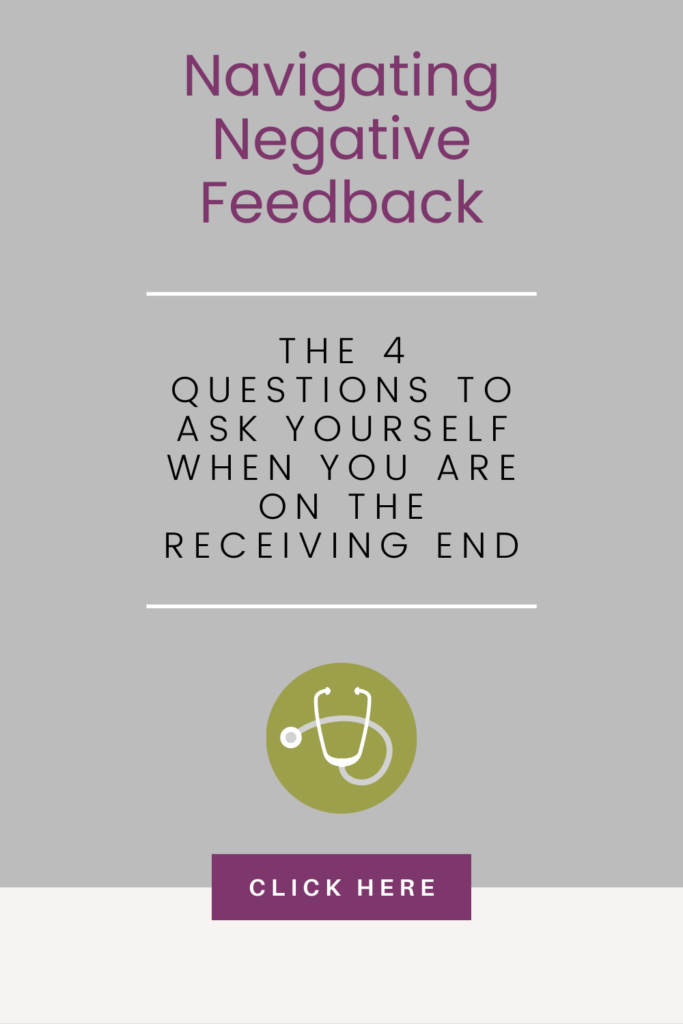Feedback is Frustrating
Feedback is frustrating. Particularly negative feedback. It just pisses me off.
There, I said it. Yes, of course, feedback, whether glowing or gutting, is a part of this life. It’s part of our lives professionally and personally.
Feedback is a necessary part of growth but damn, is feedback, specifically negative feedback, frustrating as all get out.
I have shared this often because I want to normalize the fact that receiving feedback effectively and without getting defensive is hard. It’s a learned skill. It’s something I’m still in the process of nailing down myself.
On this show oftentimes I teach what I need to learn and share what I wish someone had said to me along the way. This episode is one of those.
YouTube Video

What we will cover:
- Why feedback feels so frustrating
- The 4 Questions to ask yourself when you get negative feedback
- How to recover your confidence and fail forward
Here’s Why Negative Feedback is so Frustrating
If you are into leadership learning, are a manager or leader within the organization you work at, you’ve probably learned about giving feedback. How to direct those not-so-positive reviews that come as a part of annual performance evaluations and how to deliver that feedback in a way that is effective and collaborative.
But the real art is receiving feedback gracefully and effectively… without feeling defensive, pissed off and personally attacked. This, for me, is a work in progress and this is what we are going to focus on today!
Feedback is incredibly frustrating because, as human beings, we see feedback as a threat – real or imagined – to ourself and our success.
As humans with baseline psychology that includes loss aversion and avoidance of feedback, it’s important to identify that these things exist in our mind, whether we’ve realized or named them in the past.
Loss aversion is this phenomenon where we see a real or potential loss is as more severe than an equivalent gain. When it comes to feedback this means that we see negative feedback as far and away outweighing any positive comments or compliments that we’ve received.
Forbes says that we hear feedback as criticism, which our brains are hardwired to reject. They go on to say that “Because our brains are designed to protect us from being wrong (especially when we are wrong) we respond to criticism as if our very survival was being threatened.”
We Generalize the Feedback
Another reason that we can find feedback to be a frustrating thing that makes the hairs on the back of our neck stand up is because we generalize the feedback. We take one single piece of feedback that is about our actions and take it to be an attack on who we are.
We take the thoughts someone else shared about one specific thing that we DID and get offended that someone is attacking the very essence of who we are.
This generalization happens because of years, maybe even decades, of us having the habit of finding meaning in what those around us say and do. This makes us feel even more defensive and offended when feedback is provided.
So that, my friend, is why feedback pisses us off so much. Unless we do something about it, we will let feedback fester, having made us angry, feel badly about ourselves, or start to attack the person who gave us the feedback – out loud or in our own minds – feedback will be ineffective and not improve our skills and abilities professionally or personally.
The Battle
We are each fighting a battle between wanting to grow, learn and get better at what we do, to improve who we are and advance our professional skills… and wanting to be loved and accepted just the way we are. These two things are in opposition to each other.
If we were completely, wholly loved and accepted as we are, there would be no reason to get better, to change anything and we would stay just the way we are. Conversely, if we can only focus on wanting to grow and learn and advance ourselves professionally, we may feel like we aren’t worthy of the income we earn, the praise that is given to us, or the thanks our patients share with us.
There’s a difference between the internal, inherent worthiness that a person possesses and the feedback that is given about our professional performance. Being aware of this difference can help us to reconcile this desire to grow with the need to be loved and a part of the group.
So what do we do about feedback? From a practical approach, here are 4 questions to ask yourself when you’ve gotten negative feedback.
4 Questions to Ask When You Get Negative Feedback
- Who is the feedback from?
- What does this feedback mean?
- How can I do things differently?
- When – can I improve this by and can I ask for more feedback on this topic?
You can use this framework as a way to process, evaluate and make changes (if necessary) as a result of feedback you receive professionally or personally.
1 – Who is the negative feedback from?
Not all feedback is created equal. The feedback that is the most valuable comes from someone whose opinion you respect on a topic that they are knowledgeable about.
The first thing to address when you receive feedback is who is the feedback from?
Would you seek this person out for professional advice in the area addressed?
If the answer to that question is no, take the feedback with the obligatory grain of salt.
If the answer is YES – this is someone you would ask advice of and who’s opinion greatly matters to you – who has specific knowledge and expertise in this area, it’s good to know from the get go.
Also – what type of person gave you the feedback?
Is it your surgeon who, no matter how long or short you cut the suture, it’s either too short or too long? Is it someone that’s incredibly difficult to please? Is it someone who is generous with criticism and slow with praise?
Taking a moment to evaluate what you know about the person who gave you the feedback helps you set the stage for how seriously you want to take this feedback.
And last but not least – is this someone you’ve had a long-term relationship with professionally, who knows you well and cares for you or is it someone that you’ve crossed paths with professionally for a regularly short amount of time or a brief exposure and they’ve decided to offer you feedback from that short interaction?
A note on strangers from the internet. The internet is a strange place where everyone feels their opinion holds massive weight, is backed by science and matters. Digital courage and the lack of the ability to tell what someone’s tone is in a comment combine to create a feedback free-for-all.
It’s people that you wouldn’t recognize walking down the street, someone you definitely wouldn’t call for advice, and can sometimes be a true *Stranger* from the internet.
If you were walking down main street in your town and a literal stranger walked up to you and said “you suck at your job, you should quit, it’s ridiculous you’re not earning more. I earn more” and walked away. You would LAUGH. It would be the most outrageous interaction
2 – What does this negative feedback mean?
Next up – what does this feedback mean?
As I mentioned earlier, it’s pretty easy to jump from someone saying something about what we did to feeling attacked at the very root of who we are. That single piece of feedback on a patient interaction, a conversation with a peer or superior and we think they are criticizing who we are as a human being.
When we look at what feedback means, it’s time to take a serious look at ourselves. Was this a one time fluke or is this something you’ve been doing?
Is this truly an area of weakness that needs work, focus, and dedication or was this a series of events that were not ideal and led to that situation?
If you determine that this feedback means that you have work to do, that’s where question No. 3 comes in:
3 – How can I do things differently?
Walk through the scenario or a typical day. What could you do differently next time you get put in a similar situation? How can you practice, prepare for and feel ready to take a different set of actions?
Visualize yourself in that situation and react differently, act more quickly or slowly, whatever you didn’t do before.
The way that you answer “How can I do things differently?” is to put together an action plan of proficiency and how to plan to change your reaction or skillset.
Try to separate the emotions you are having about the feedback you’ve received and ask yourself – what can I do to improve?
Actually – let’s take a moment to talk about those emotions. Getting feedback is emotional. My knee-jerk reaction when someone gives me feedback has *always* been to start running through a list of reasons in my mind why they aren’t perfect and saying things like “who do they think they are”.
When emotions crop up, which they will, instead of hopping on the train to angry town or defensiveville which is where I liked to head, see the emotion and choose to let it pass.
See the anger. Name the fact that you feel angry. And let it go.
It’s really hard to create an action plan for yourself, to identify the steps to improve in a certain area, if you are blinded with anger or defensiveness or even sadness.
It’s OK to be upset when you are on the receiving end of feedback. What we want to aim to do is to work through those emotions to the point where we can see the feedback clearly for what it is – it’s information to use to make you better.
Even when the person who delivered it isn’t your favorite.
Even when you are upset that it needed to be said at all.
Even when you’ve been working to improve and STILL there was negative feedback…
That feedback is information to use to make you better.
4 – When – can I improve this by and can I ask for more feedback on this topic?
When is a two-part question:
When can I aim to improve this by? &
When can I ask for more feedback on this topic?
Let’s start with when can I aim to improve this by?
Setting a deadline makes these action items timely. Just like the T in SMART goals – a time-bound goal is more likely to be accomplished than if you don’t tie it to specific timing or a deadline.
When is a reasonable amount of time to improve in this area? Is this a massive overhaul of skills or a smaller tweak?
Set a deadline. Write it down. Share it with someone who can lovingly hold you accountable when the time comes and ask you if you did it.
You’re going to want to wrap up your feedback debrief with the question when can I ask for more feedback on this topic?
Consider the specific scenario that generated the feedback. How often does it happen? When is it likely to happen again?
And when can you seek out additional feedback to see if you’ve approved in this area or not?
Negative Feedback as an Objective Input
As we wrap up, think about medicine, human bodies and physiology when it comes to feedback.
Think about negative feedback, instead of as criticism or attack, think of it as a signal, just like inside the back. Physiologically there are a ton of feedback loops that help to keep us alive, breathing, making the correct amount of thyroid hormone and excreting the right amount of sodium and potassium. Although renal pathophysiology isn’t my specialty, I DO know that the kidney is full of these loops that provide feedback to prompt an adjustment or change in the way we are resorbing or excreting things back into our bloodstream or out into our urine.
Think about feedback, even negative feedback, like those anatomic and physiologic feedback loops. Information comes in, adjustments are made and homeostasis is achieved. Things improve based on the input into the feedback system.
Think about this feedback, criticism, or constructive comments as objective input into your system. It’s not about you, it’s that there is too much sodium, and you need to excrete more.
Remember to practice not taking this feedback personally and be careful not to generalize the feedback on one task you’ve performed or what you could do differently to be about who you are. Feedback is about what you’ve done, not who you are. It’s not an attack on your character or even ALL of your abilities. It’s information to base your growth on and to narrow your focus for areas of improvement.
And sometimes it’s a comment from a stranger on the internet and you should just let it go!
Pin for Later






